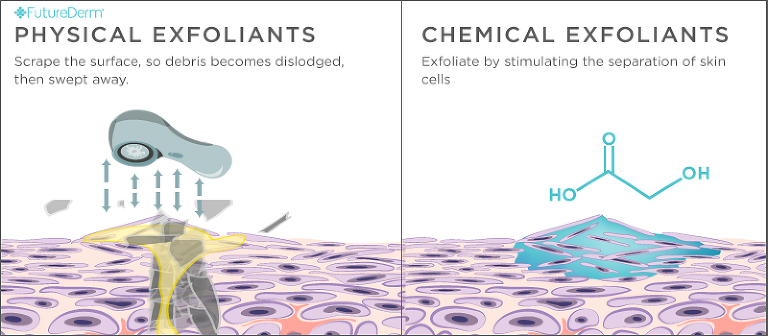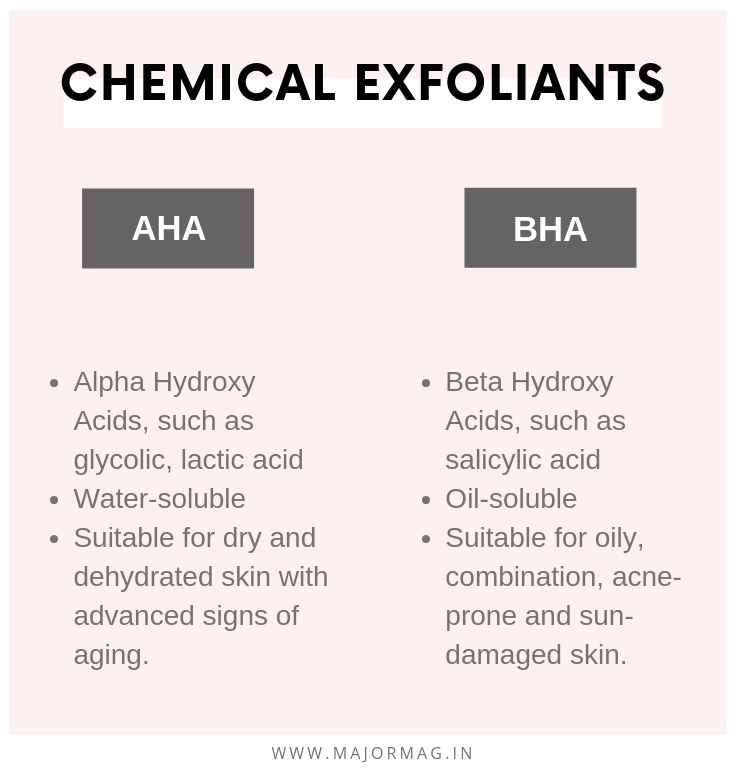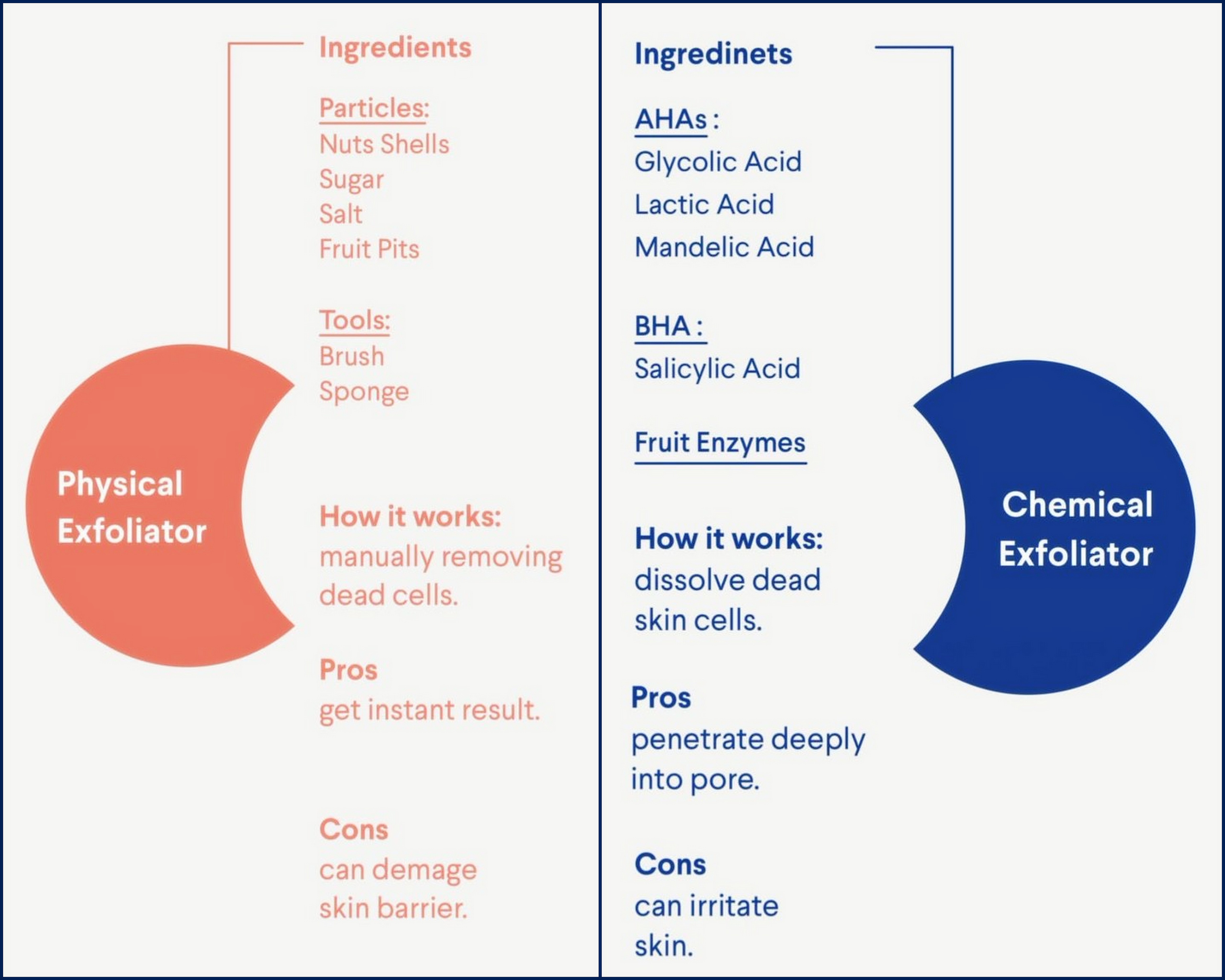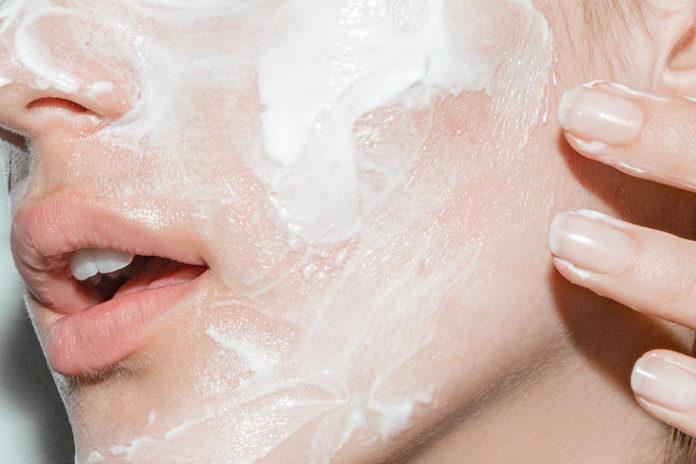Exfoliation is a crucial step in your skincare routine because it can address so many concerns easily. A lack of exfoliation leads to a buildup of dead skin cells, which may yield one or more of the following: dull, dry, or flaky skin, acne breakouts, clogged pores, and uneven skin tone. Regular exfoliation increases skin cell turnover which means that the rate where new skin cells are produced is faster because it has a clearer path to the surface without all the dead cells blocking the way.
Exfoliation improve the effectiveness of topical skin treatments, which can penetrate deeper once the top layer of skin is removed. You can exfoliate two ways: physically (or manually) and chemically. While the second option sounds rather harsh, it can actually be the gentler of the two options. How, you ask?
The quick and dirty answer is this: Unlike physical exfoliants, products containing acids or enzymes require no scrubbing which makes it suitable for those with problem skin, whether it’s prone to acne, eczema, dryness, or even sensitivity. This is why chemical exfoliants can in fact be milder and gentler than scrubs.
Once applied, a chemical exfoliant not only works on the top layers of skin. The acids and enzymes can also penetrate and work on layers not yet visible to the eye. This creates a long-lasting increase in your natural exfoliation rate.

What is Physical Exfoliation?
Physical exfoliation involves using various tools (motorized sponges/brushes, or rough sponges/scrubs that do the same job but without the motor), or abrasive substances to physically slough away the outermost layer of the skin. This type of exfoliation removes dead cells through abrasion by using hard particles (either mineral-derived or nut-shells), usually mixed with a cream/gel/oil base in order to make the process smoother.
Most scrubs have rough, coarse textures, which can be harsh, causing micro-tears in skin (gentle scrubs and soft cleansing brushes are the exception), and they should only be used when skin really needs it. Those of you who have sensitive skin, opt for very finely-grained scrubs/cleansers, and try to avoid any products with nutshells or fruit pits that can irritate skin.
What is Chemical Exfoliation?
While it may sound scary, chemical exfoliation is actually the safest way to gently exfoliate your skin. Skin naturally sheds built-up layers of dead cells, but this process slows dramatically as we get older. Thankfully, chemical exfoliation can help with that, since it helps dissolve the ‘glue’ that cements dead skin cells together and stimulates the growth of healthy skin.
Chemical exfoliants are generally acids (AHA, or alpha-hydroxy acids, and BHA, beta-hydroxy acids), commonly referred to as ‘peels’ or ‘treatments’. These acids come in the form of cleansers, masks, moisturizers, serums or pads. The two most popular AHAs are glycolic acid and lactic acid while BHA usually refers specifically to salicylic acid.
Since understanding chemicals can be a little tricky, here are a few suggestions for each skin type:
• Combination to Oily Skin: If your skin falls under this category, use an AHA or BHA 2-3 times a week, and use a face scrub once a week.
• Combination to Dry Skin: If you have skin that is dry, you can use any Glycolic/Lactic-acid-based cleanser in place of your daily cleanser twice a week and use a face scrub once a week, or use the Glycolic-acid-based toner daily and a face scrub once a week.
• Oily/Acne-Prone Skin: Such type of skin responds best to products that contain Salicylic Acid. Unlike AHAs, salicylic acid is oil soluble, it’s able to unglue a keratin plug and penetrate through the sebum to the lining of the pore, releasing some of the oil and bacteria before it can cause acne. It also has anti-inflammatory properties since it’s derived from a compound similar to aspirin.
• Dry/Sensitive Skin: Lactic acid is the best and gentlest option for sensitive and dry skin types. Always read the label carefully, if a product contains more than three acid substances, it could potentially be irritating.

Physical vs. Chemical Exfoliation
Is one better than the other? Generally speaking, chemical exfoliation is more effective than physical. Chemical exfoliators are better for most skin types because they are more efficient, and they also have added benefits like hydrating the skin and improving hyperpigmentation. Chemical exfoliators are less abrasive and are preferred by sensitive, and mature skins. They target fine lines, acne and breakouts too.

Whether you choose a physical or chemical exfoliant, both will help your skin slough more quickly on its own. But deciding which version is best for you depends on your skin type and concerns. If you’re looking for a product that deep cleanses as well as targets acne, or if your skin is damaged by the over-exposure of sun — a chemical exfoliant is a better choice for you.
You can safely use both, physical and chemical exfoliants, on alternating days as well. All you gotta do is experiment and see what works best for you.
PLEASE NOTE
» If you don’t already use an SPF in your morning routine, DO IT NOW. Your skin will be more photo-sensitive whilst being treated. Opt for a broad-spectrum (SPF30+) sunscreen to protect the skin.
» It’s important to soothe and protect skin post-exfoliation, and that means loading up on hydrating moisturizers/serums. Look for ingredients like hyaluronic acid, ceramides, peptides etc.
» Avoid over-exfoliating which can possibly cause irritation, inflammation like acne, make you more susceptible to sunburn and you can lose moisture and disrupt the natural skin barrier.
» If you’re using a topical prescription product such as retinol, read this guide on how to combine retinol and acids into a skincare routine.
For more on fashion & beauty, follow Major Mag on Instagram and Pinterest.
You may also like
AHA vs. BHA: A Beginner’s Guide To Chemical Exfoliation
Everything You Need To Know About Hyaluronic Acid
